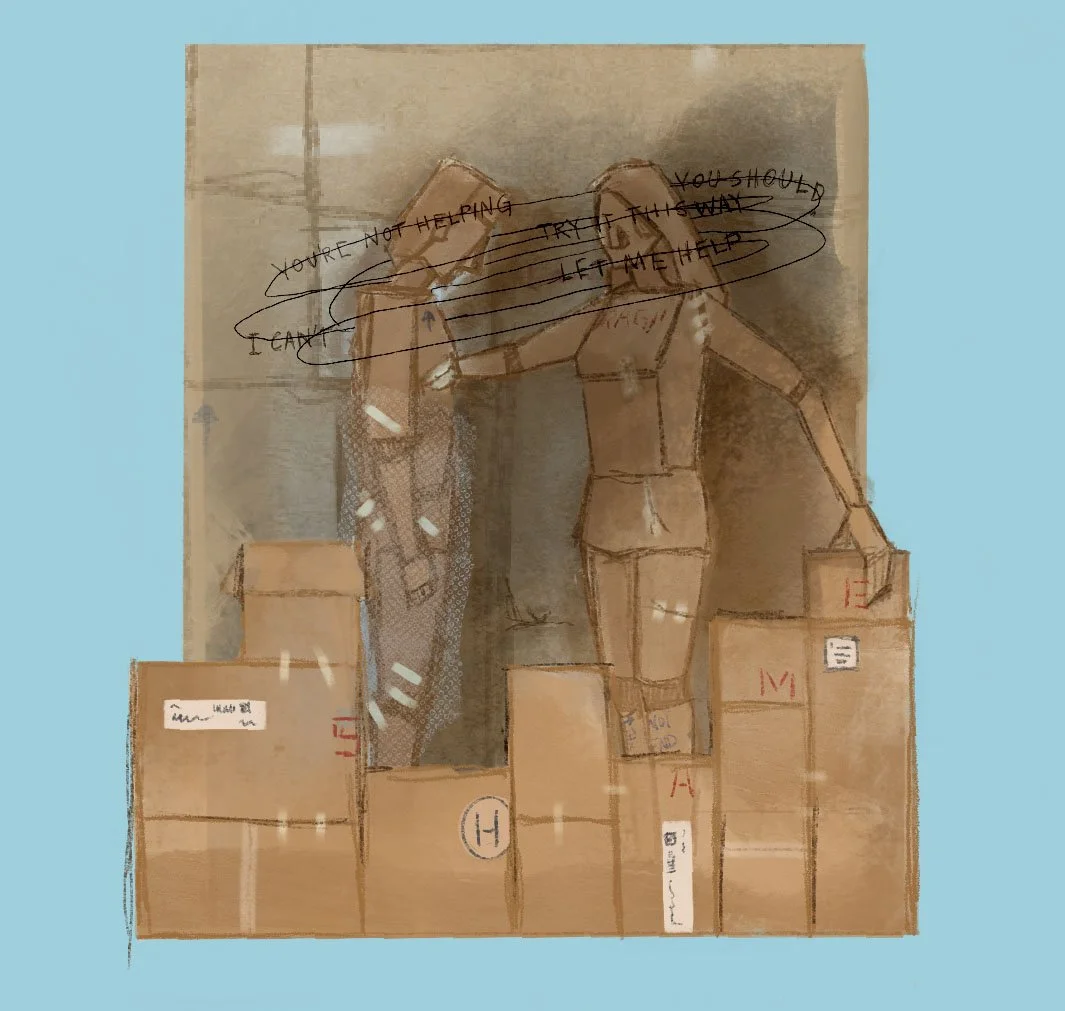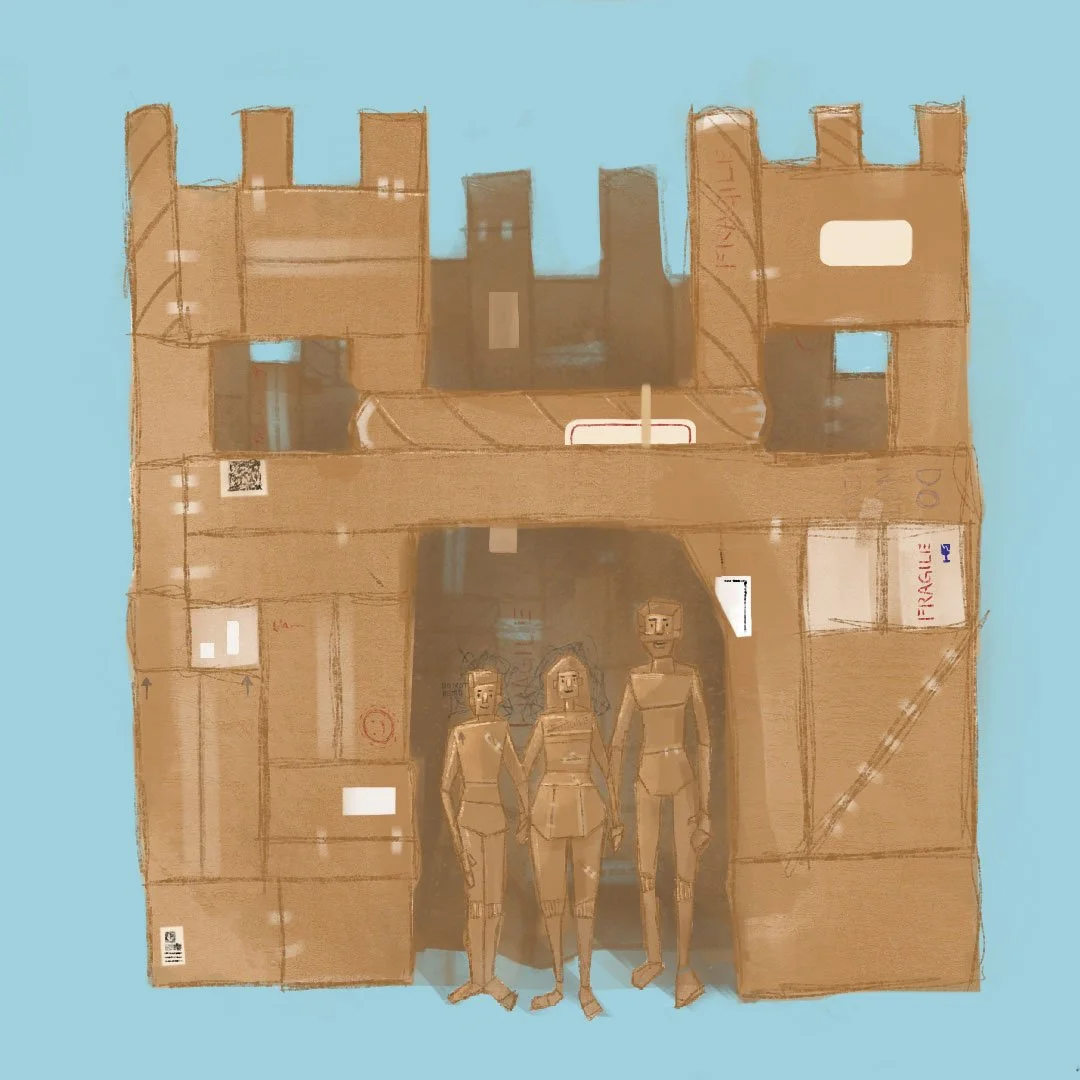Shame to self-discovery: a mother-son ADHD story
IN PARTNERSHIP WITH UNLIKELY COLLABORATORSIllustrations by Annie B. McCall
by Jessi Cape
Our family is in the midst of a big move, from an apartment to our first house, and the task management struggle is real. Sure, the physical labor is intense, but for those of us managing ADHD, more difficult is the overwhelming amount of tasks involving minutiae. Tedium, after all, feels equivalent to torture when your brain is a dopamine fiend. The distance between project start to reward is long, winding, and full of enticing booby traps. Factor in a beautiful, complicated gift that is the mother-son ADHD double whammy, and voila! You have a party.
Neurodivergence is many things being true at the same time. There’s an increased tendency for creative thinking, but it’s met with distinct disdain for focusing on “uninteresting” subjects, which, by the way, could change from moment to moment. On the flip side, there is often, in our experience, a unique ability to hyperfocus when the wind blows that direction, but it’s occasionally at the expense of “must do” to-dos. As one Instagram meme explains, “ADHD is being able to clean someone else’s house when they need help, but staring at your own room for 15 hours trying to figure out how to get the executive functioning to clean.” C'est la vie.
What’s particularly difficult, as I’ve come to realize, is being the responsible party keeping everyone on track of an externally imposed deadline with zero flexibility. Like the end of a lease. As I find myself fumbling to chart a path forward—for us both—I’m eternally grateful for a partner whose own neurodivergence is a missing piece of our puzzle. He’s extremely good at time management, for example. But, as with all things ADHD, the sword is double-edged, and I find myself navigating unintended shame. Shame that, despite moving a whopping 22 times, causes me to quite literally spin in circles. Shame that is linked to being at my sharpest, my most snippy of tones, even when trying to lead by example. Shame that weighs on me because I cannot for the life of me balance both patience and efficiency.
To some degree, it’s naturally occurring shame, in part due to being raised by wolves and released into the urbane land of “should.” You should be able to stay on track. You should tackle one room at a time. You should be able to sort your belongings into neat piles of keep, toss, and donate—and you should definitely not dilly-dally. (To which I say, what’s the fun in packing your life into boxes if you can’t try on old hats or skim through handwritten notes from your third-grade bestie?)
The realization about ADHD, both for him and me
Annie B. McCall
My son’s ADHD diagnosis was a revelation—though it also came with its own set of challenges. At first, it felt like both a blessing and a curse. I could see the same beautiful, wild energy that had always been a part of him, but now, I could also see how his brain processed the world differently from those around him. The realization that my brain, too, operates in similar patterns has been both a surprise and a sort of liberation. I’ve spent years wondering why certain tasks felt so impossible, only to realize … maybe it’s just the way my brain works.
I was raised in an era that didn’t really understand ADHD, let alone offer solutions that worked for me. Back in the 80s, despite never obtaining a formal diagnosis, my pediatrician suggested medication, but my mom didn’t want that for me. Instead, she tried to help me find workarounds, learning to build my life around my tendencies, but without understanding why things were so difficult.
My then-solution? Perfectionism. It’s part of what makes me a really good editor (deadlines, details, duties). It also stinks of self-doubt mixed with self-loathing and a big dollop of imposter syndrome.
This functioning but faulty understanding has influenced big decisions in our family life. When it came to making the decision for my son to try medication, I realized I couldn’t let my own hangups (aka shame) cloud the process. It wasn’t about “fixing” him; it was about supporting him in a way that might help his brain do what it does best. It took a lot of work for me to accept that needing support doesn’t make you broken. In our house, we believe asking for help is a strength!
As an “elderly” millennial woman (I am 41) raising a Gen Z young man, much of my own shame is self-imposed. Or rather, directly related to how I view the world and my performance inside it. When you grow up with certain ideals of what success looks like—both as a parent and as a person – and find yourself feeling like you're always falling short, it’s hard to separate those external expectations from your internal reality. It was especially hard for me not to link my mothering with my perceived inadequacies.
So I spent the first chunk of my now 15 year-old son’s life comparing myself to other moms. Not necessarily in the obvious ways, but more the “I stayed up all night baking a brand new recipe instead of just buying the damn cupcakes” kind of way. It was eerily similar to my elementary school obsession with straight A’s, and staying up all night to perfect a book report. Sure, there is great reward in succeeding, but not at the detriment of one’s health – mental, physical, or otherwise.
I’d stay up late (not sleeping when the baby slept), wondering: Is my own “chaos” responsible for his?
Turns out, one special trait of ADHD can be Rejection Sensitive Dysphoria. Essentially, it “is when you experience severe emotional pain because of a failure or feeling rejected. This condition is linked to ADHD, and experts suspect it happens due to differences in brain structure. Those differences mean your brain can’t regulate rejection-related emotions and behaviors, making them much more intense.”
The more I learn, the clearer it becomes that ADHD is rarely an isolated condition. The growing evidence about the comorbidities between ADHD, autism, OCD, and so many other neurodivergent traits is staggering. It’s one of those things that feels like an unfolding revelation—one full of overwhelm—because you start to see connections where you never expected them. And with that knowledge comes the understanding that my son's struggles, while deeply personal to him, are part of a bigger, shared experience. He is not alone in this. Neither am I.
Parenting an ADHD teen is a constant emotional push and pull. It’s a raucous rollercoaster of moments of love, awe, frustration, doubt, and joy. You want to help your child thrive, but despite your best efforts, things often go haywire. I learned this firsthand: What I thought was helping with schoolwork – organizing, structuring, even disciplining – sometimes ended up creating feelings of shame for my ADHD teen. What I was doing came from a place of deep and abiding love, but that didn’t make it correct. Even worse, it made me and everyone in our home feel like crap.
I’ll be forever grateful when the lightbulb finally illuminated the crux of the issue: I was projecting my own school shame onto my son, and it was not only damaging my relationship with him but also absolutely not helping him accomplish the task(s) at hand. It was sucking out what little dopamine-fed excitement the project brought and building a wall of shame around us both instead.
The power of self-awareness and repair
My attempts to "fix" things unintentionally fed into four types of shame—personal, interpersonal, existential, and collective. These aren’t just abstract ideas; they’re real, raw emotions my teen faced every day. Samesies.
One night, after another back-and-forth headache-inducing argument, something clicked. My relationship with my son is paramount, but my relationship with myself is important too. I am modeling behavior, for better or worse, so I might as well treat myself with more respect so he can see that in action. The coolest “aha” was realizing that we have this one life, and we might as well make it fun. Not only does reworking dusty old to-dos into exciting projects or reward-driven adventures make it more enjoyable, but it also makes it more possible for an ADHD brain. Or two ADHD brains.
An illumination from “ActivatedADHDMama”: Your kids don’t need you to be perfect. They need you to know how to take responsibility and repair when you lose your cool. They also need you to be self-aware enough to know what triggers you and how to avoid it as much as possible…”
Annie B. McCall
The science behind neuroplasticity – the brain’s ability to rewire itself – offers hope. (All is not lost!) While shame can create deeply ingrained thought patterns, the brain’s capacity for growth means change is possible. Shifting from a "fixing" mindset to one focused on empathy and growth has created new paths for healing.
Today’s teens face unique pressures—social media, academic expectations, and the constant drive for perfection. For ADHD teens (mine and most of them), this can amplify feelings of shame and isolation. For my son, one manifestation has been largely rejecting any “accommodations” that are available to him. Instead of mandating those changes and modifications, we discuss them. We try new things and get innovative. We put our naturally creative minds to work!
Maybe most importantly, we acknowledge our feelings. Saying “sorry” doesn’t always fix things, but it’s damn sure a good start.
Oh, and our big move? We did it. We focused on our strengths. My superhero football player hauled things; I packed. We both organized. We both cleaned. We both vocalized needing a break and feeling like our heads were going to explode. We shared snacks. We set timers—see Pomodoro method—and utilized Siri.
Our experiences of reconciliation and healing are increasing, but of course, there are definitely still big, ugly stumbling blocks. But by embracing open communication, offering apologies, and shifting focus from fixing to acceptance, the goal is to create a space where we can both thrive—free from shame.
Going forward: What will happen with a driver's license? How—or do we prepare for college? Honestly, I have no idea yet. But we’re having fun making memories while we figure it out.
Our journey of rebuilding our relationship has transformed both of us and opened my eyes to my own ADHD struggles. Realizing that our experiences, although so different, have parallels and can guide us toward growth has been the honor of a lifetime. So it’s truly a message of hope: We can learn to break the cycle of shame—together.
Jessi Cape is a writer and editor based in Austin, Texas, with experience across journalism, associations, and brand creative. A former Senior Editor at The Austin Chronicle and current Managing Editor at Medicinal Media, her work often focuses on women, children, and nature. She is currently writing several feature film scripts about complex, resilient humans while trying to be one herself.
Annie B. McCall is a multidisciplinary artist in Austin, TX. She works in various artistic mediums including theatre, painting, illustration, 2D animation, stop motion, and music.



